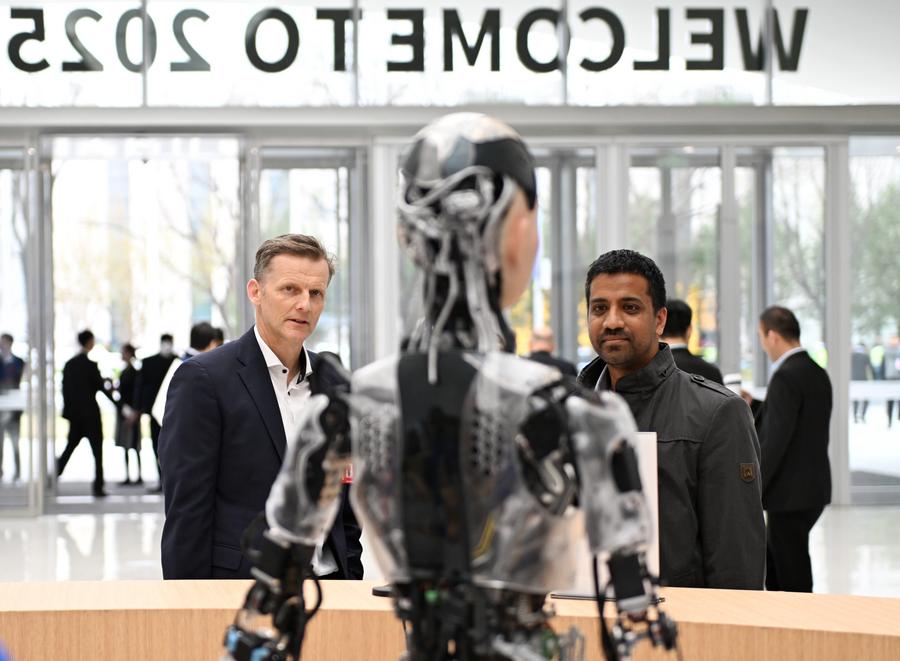


People learn about a bionic humanoid robot at the Zhongguancun International Innovation Center during the 2025 Zhongguancun Forum Annual Conference in Beijing, capital of China, March 27, 2025. (Xinhua/Zhang Chenlin)
BEIJING, March 30 (Xinhua) -- The rapid development of artificial intelligence (AI) technology, an innovation pillar empowering China's smart manufacturing, green transition and even breakthroughs in space sciences, is proving to be a key driver of the nation's high-quality growth, noted international industry experts at a key forum.
Under the wave of the explosion of AI technology, 2025 will be the first year of large-scale AI application implementation," said Kai-Fu Lee, CEO of 01.AI and chairman of Sinovation Ventures at the 2025 Zhongguancun Forum Annual Conference in Beijing.
Large models have brought about a revolution in productivity, he said, adding that their intelligence continues to improve with the constant emergence of new technologies, marking the advent of an era characterized by large model applications.
A defining application trend showcased at the event is the convergence of AI and new energy vehicles (NEVs), which represents a strategic priority in China's carbon neutrality roadmap. This synergy was epitomized by Li Auto's intelligent driving demonstration, which has captured considerable attention within the industry.
All-scenario navigation assist driving feature developed by the company enables vehicles to autonomously change lanes and overtake, enter or exit ramps, pass intersections in response to traffic lights, and avoid or detour around roadwork obstacles. It has made it easier to drive safely on highways and drive proficiently on urban roads, the company said.
The automotive industry has entered a transformative era of intelligence, marking an evolution from mere transportation tools to AI terminals, said Li Xiang, the CEO of the company.
At the exhibition venue, nearly 100 robots from 15 companies are actively engaged throughout the event to enhance the experience of the attendees. More importantly, they showcase how humanoid robots are rapidly advancing to boost productivity and expand their real-world applications.
A humanoid robot named "Adam" amazed visitors with an elegant dance during the conference, showcasing its advanced full-body motion control. Through the fusion of unique hardware design and reinforcement learning, the development team has enabled Adam to coordinate joint movements precisely, achieving human-like agility and flexibility, explained Anna Leung, brand director of Adam's developer, PNDbotics AI Co., Ltd.
"The most exciting era for humanoid robots, the era of productivity, is about to begin," said Wang He, founder and CTO of Beijing Galbot Co., Ltd. The ability of humanoid robots to integrate vision-driven guidance, limb control, and generalized autonomous operation truly makes them valuable assistants to humans, said Wang.
In the 2025 government work report, China vowed to effectively combine digital technologies with its manufacturing and market strengths. It will support the extensive application of large-scale AI models and develop new-generation intelligent terminals and smart manufacturing equipment, including intelligent connected NEVs and intelligent robots.
As China steadily advances toward its dual carbon goals, fast-developing AI technologies also contribute significantly with their applications in sectors such as new energy integration, energy production and smart energy consumption, according to industry experts.
For instance, AI plays an important role in the construction of a new type of power system. By enhancing smart grid regulation and source-grid-load-storage coordination, it addresses grid stability and security challenges as the renewable energy penetration rate continues to rise, according to Ren Jingdong, deputy director of the National Energy Administration.
Wang Chi, director of National Space Science Center under the Chinese Academy of Sciences, told Xinhua that AI will play a critical role in future interplanetary exploration, as spacecraft control systems need to be more intelligent for more distant solar exploration, particularly Mars and Jupiter.
Sending humans to the destinations entails unacceptable hazards, but deploying intelligent agents and robotic systems for preliminary exploration would be able to reduce risks in extreme exploration scenarios, said Liu Hangxin, co-executive director at the frontier research center at the Beijing Institute for General Artificial Intelligence.
点击右上角![]() 微信好友
微信好友
 朋友圈
朋友圈

请使用浏览器分享功能进行分享
